Promises and purposes
A list of repetitive promises does not make up a manifesto.

. PHOTO: INP
As would be predicted, the party, which has ruled since 2008, mentions in some detail its achievements over this period including various schemes intended for the poor and other projects which leaders of the party flanking Mr Faheem stated had achieved a great deal. This, of course, is the way party manifestos go. The PPP-P has also blamed provinces for failing to make use of the powers devolved to them and dealing with problems which include law and order and the power shortfall. This, of course, is partly true, but it is also a fact, as provinces have said repeatedly, that they lack both resources and experience to tackle such major problems.
The main issue though is that a list of promises does not really make up a manifesto. Most people in the country have come to realise that such slogans are virtually meaningless in themselves and that a great deal more is needed if their lives are ever going to change. It is also a fact that manifestos figure only at election time and are more or less cast aside after this. No one really refers back to them or to the pledges made in them. But manifestos mean more than this. Merely saying it intends to serve the poor and going back to nostalgic slogans which emphasise this, really achieves little purpose. Actual action is required and this is what people across the country yearn to see from the political leadership after they cast their ballots.
Published in The Express Tribune, March 18th, 2013.














COMMENTS
Comments are moderated and generally will be posted if they are on-topic and not abusive.
For more information, please see our Comments FAQ